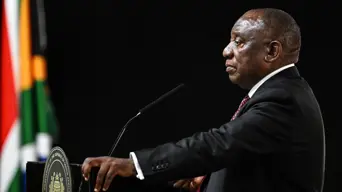Ramaphosa nominates candidates for deputy chief justice
This, almost a year since the position became vacant with the appointment of Mandisa Maya as chief justice in September last year.

President Cyril Ramaphosa. Picture: Phando Jikelo/Parliament
JOHANNESBURG - President Cyril Ramaphosa has finally nominated candidates for appointment to the position of deputy chief justice.
This, almost a year since the position became vacant with the appointment of Mandisa Maya as chief justice in September last year.
Gauteng Judge President Dustan Mlambo, who interviewed for the chief justice post in 2022 and leads the busiest division in the country, has emerged as a frontrunner for the position.
However, none of the president’s nominations stem from the current apex court bench.
Section 174 subsection 3 of the Constitution grants the president the authority to appoint the chief justice and their deputy, as well as the president of the Supreme Court of Appeal and their deputy, after consultation with the Judicial Service Commission and leaders of parties represented in the National Assembly.
Currently, Justice Mbuyiseni Madlanga is acting in the position but is due for retirement in July this year, where he would have served a non-renewable term of 12 years on the Constitutional Court bench.
In a letter to Chief Justice Maya by President Ramaphosa seen by EWN, Ramaphosa has nominated Gauteng Judge President Dunstan Mlambo, president of the Supreme Court of Appeal, Mahube Molemela, Free State Judge President John Musi and Northern Cape Judge President Pule Tlaletsi.
Eyewitness News understands that the letter was also sent to the uMkhonto weSizwe party’s parliamentary leader, Dr John Hlophe, DA leader, John Steenhuisen and EFF leader, Julius Malema, among others.
These officials, along with top jurists as well as other members of the JSC, will now have to convene to consider the nominations made by the president.
While the president must consider their views, he is not legally bound by the outcomes of their deliberations.